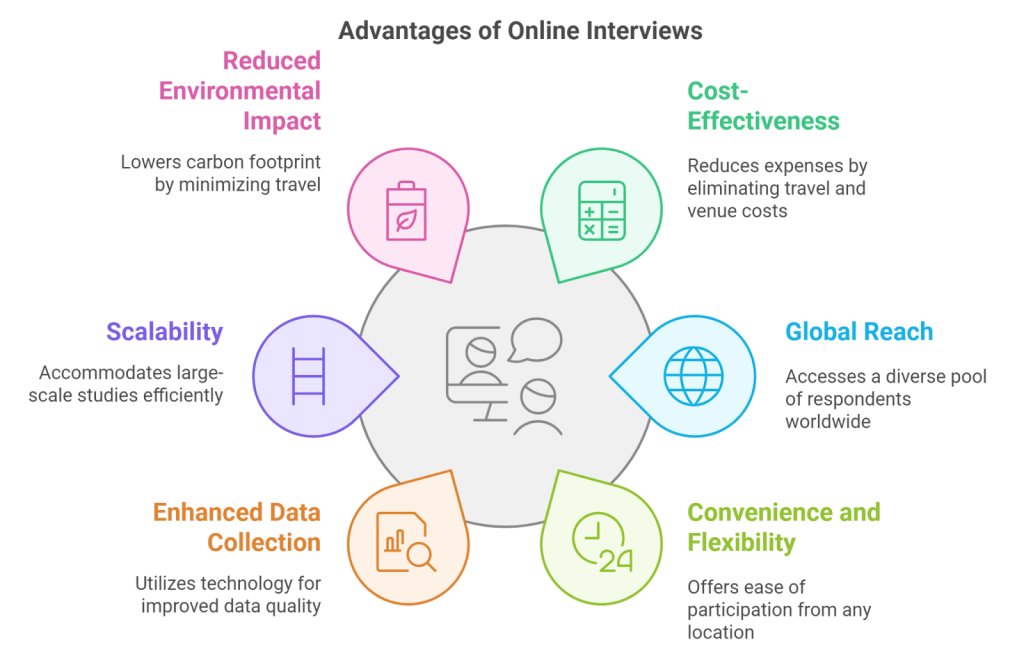F2F Interviews and Online: The Pros and the Cons

While traditional F2F interviews have been the norm for decades, online interviews are becoming more efficient and cost-effective.
Why stick to outdated methods when technology offers a better way? The debate of F2F interviews and online is no longer about convenience—it’s about maximizing value.
What Are F2F Interviews and Online Interviews?
Understanding the difference between F2F interviews and online is crucial for determining the most effective method for market research. Both approaches aim to gather insights – but their execution, scalability, and practicality set them apart.
F2F interviews are conducted in person, typically in controlled environments such as offices, focus group facilities, or on-site locations. Their traditional nature has long been considered a gold standard for qualitative data collection, particularly for studies requiring deep emotional engagement or sensitive topics.
Online interviews, on the other hand, leverage digital tools such as Zoom, Microsoft Teams, or specialized survey platforms to facilitate interactions remotely. Participants and interviewers connect from different locations, often globally, using video, audio, or even text-based communication.
So… What’s the Discussion?

When comparing F2F interviews and online, the primary distinction lies in accessibility and efficiency. F2F interviews demand significant logistical planning, including scheduling, travel arrangements, and venue costs. This can limit participation to local or regional respondents and increases the overall cost of the research project. Conversely, online interviews eliminate geographical constraints, enabling businesses to engage diverse demographics with minimal expense and time investment.
Another critical difference is the role of technology. Online interviews offer automatic transcription, real-time data capture, and advanced analytics, which streamline the research process and enhance accuracy. In contrast, F2F interviews rely on manual processes, making them more resource-intensive.
The Pros of Online Interviews
Online interviews have revolutionized the way businesses approach market research. Their advantages are not just about convenience—they represent a fundamental shift in how insights are gathered, analyzed, and utilized.

1. Cost-Effectiveness
One of the most significant advantages of online interviews is their ability to minimize costs. Unlike F2F interviews, which require expenses for travel, venue rentals, and interviewer logistics, online interviews eliminate these overheads.
2. Global Reach
Where F2F interviews are limited to local or regional participants, online methods enable researchers to access a diverse pool of respondents worldwide. This is particularly valuable for businesses operating in global markets or seeking insights from multicultural audiences.
3. Convenience and Flexibility
For both participants and researchers, online interviews offer unmatched flexibility. Participants can join interviews from the comfort of their homes or offices, reducing scheduling conflicts and increasing participation rates.
4. Enhanced Data Collection
Integrating technology in online interviews provides researchers with tools unavailable in traditional F2F interviews. Features such as real-time transcription, recording, and screen-sharing improve the quality and depth of data collection.
5. Scalable for Large-Scale Studies
Online interviews are highly scalable, making them ideal for large-scale studies. Businesses can engage hundreds—or even thousands—of participants without the logistical challenges associated with coordinating F2F interviews.
6. Reduced Environmental Impact
Eliminating travel and venue use significantly reduces the carbon footprint of the research process. In a world increasingly focused on sustainability, online methods align with corporate social responsibility goals, offering an eco-friendly alternative to traditional face-to-face approaches.
The Cons of F2F Interviews

In the ongoing debate of F2F interviews vs online, face-to-face methods, while historically popular, have several significant drawbacks that make them less appealing in modern market research. These limitations often outweigh their benefits, especially when compared to the efficiency and scalability of online interviews.
1. High Costs
F2F interviews are notoriously expensive. Costs include travel for researchers and participants, venue rentals, equipment, and additional logistical support. For businesses conducting large-scale studies, these expenses can quickly escalate, making F2F interviews an inefficient option compared to the cost-effectiveness of online alternatives.
2. Geographic Limitations
Face-to-face interviews are confined to specific locations, reducing the diversity and reach of participant pools. Researchers are often limited to respondents near the interview location, which can skew data and fail to represent broader demographics. In contrast, online interviews eliminate these geographic barriers, allowing access to a global audience.
3. Time-Consuming
Coordinating and conducting F2F interviews is a time-intensive process. From scheduling participants and arranging travel to setting up venues and managing logistics, the time required can delay project timelines significantly. Online interviews streamline these processes, enabling researchers to gather insights much faster.
4. Limited Participant Availability
Participants in F2F interviews must take time out of their schedules to travel to designated locations. This requirement often results in lower participation rates, particularly for individuals with demanding work schedules or family responsibilities. Online interviews offer the convenience of participating from any location, significantly increasing respondent accessibility and willingness.
5. Health and Safety Concerns
Even beyond pandemics, health and safety concerns can make F2F interviews less viable, especially in industries with strict safety protocols. Online interviews provide a safe alternative, ensuring research continuity without compromising the participant or researcher’s well-being.
6. Logistical Complexities
Coordinating schedules, securing appropriate venues, and managing on-site support can create bottlenecks in the research process. These complexities add layers of stress and inefficiency, which are virtually eliminated in online research setups.
7. Lack of Scalability
Scaling F2F interviews for larger studies is challenging and costly. Each additional participant increases logistical demands and expenses. Online interviews, on the other hand, can handle significant participant numbers with minimal added effort, making them ideal for research requiring broad representation.
Key Factors to Consider When Choosing Between F2F Interviews and Online
When deciding between F2F interviews and online, businesses must evaluate their specific goals, audience, and project requirements. While both methods aim to uncover valuable insights, understanding the key factors that differentiate them is essential for selecting the right approach.
1. Budget Constraints
Online interviews are the more practical choice for organizations with tight budgets. The cost savings from these methods can be redirected toward broader participant recruitment or advanced data analysis.
2. Geographic Reach
Online interviews allow businesses to access participants globally, providing richer and more representative data.
3. Project Timeline
The ease of scheduling and conducting interviews virtually accelerates the research process. F2F interviews, with their logistical complexities and longer preparation times, are better suited for smaller, localized studies rather than time-sensitive projects.
4. Nature of the Research
For projects requiring non-verbal cues, such as body language or subtle emotional reactions, F2F interviews may still hold value. However, advancements in video conferencing technology now allow online methods to capture many of these nuances effectively.
5. Participant Accessibility
Online interviews offer unparalleled convenience, enabling participants to join from their homes or workplaces. In contrast, F2F interviews require travel, discouraging participation and limiting the sample size.
6. Data Collection and Analysis
Online interviews integrate seamlessly with modern data analysis tools, offering features like real-time transcription, sentiment analysis, and cloud storage for recordings.
7. Environmental Impact
The choice between F2F interviews and online also has sustainability implications. Online interviews reduce the carbon footprint associated with travel and resource use, aligning with the growing focus on environmentally responsible business practices.
What Makes SIS International a Top Online Interview Company
SIS International has earned its reputation as a leader in online interviews by combining cutting-edge technology, global reach, and decades of expertise in market research. As businesses increasingly prioritize online methods over F2F interviews, SIS International provides unmatched solutions tailored to meet the needs of modern research.
1. Advanced Digital Platforms
SIS uses state-of-the-art online platforms to conduct seamless and efficient interviews. These platforms have features such as real-time transcription, automatic recording, sentiment analysis, and secure data storage.
2. Global Reach and Participant Diversity
SIS International specializes in reaching participants across the globe. Whether your target audience is in North America, Europe, Asia, or beyond, SIS ensures representation from diverse demographics, enabling businesses to gain comprehensive and culturally relevant insights.
3. Expertise in Online Moderation
SIS International’s team of experienced moderators knows how to engage participants, ask probing questions, and adapt to the dynamics of virtual interactions. This expertise ensures that online interviews are as engaging and insightful as their face-to-face counterparts.
4. Cost-Effective Solutions
SIS International’s online methods provide significant savings by eliminating travel, venue rentals, and logistical expenses. We enable companies to allocate their budgets more strategically while delivering high-quality results.
5. Real-Time Insights and Analytics
SIS integrates advanced analytics tools into their online interviews, providing real-time insights that help businesses make faster decisions. From sentiment analysis to thematic mapping, these tools ensure clients can derive maximum value from their research data without delay.
6. Secure Data Handling
Our platforms comply with global data protection regulations, such as GDPR and CCPA, ensuring that sensitive participant and client information is protected. Unlike traditional F2F interviews, where physical data storage poses risks, SIS’s secure digital solutions offer peace of mind.
7. Extensive Industry Experience
With over 40 years of market research expertise, SIS International has worked with businesses across various sectors, including technology, healthcare, finance, and consumer goods. This experience enables them to adapt their online interview strategies to meet the unique demands of different industries.
About SIS International
SIS International offers Quantitative, Qualitative, and Strategy Research. We provide data, tools, strategies, reports, and insights for decision-making. We also conduct interviews, surveys, focus groups, and other Market Research methods and approaches. Contact us for your next Market Research project.

